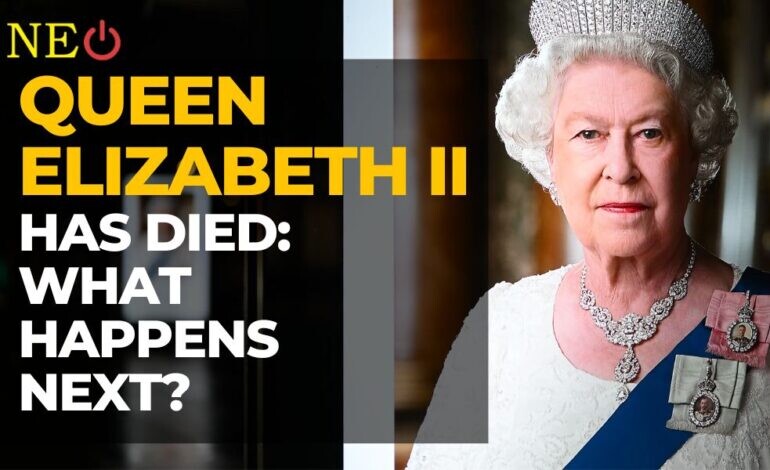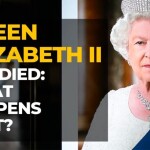According to a statement sent to Insider by Buckingham Palace, Queen Elizabeth II passed away on Thursday. The Queen died peacefully at Balmoral this afternoon," a statement issued by Buckingham Palace on Thursday evening at 6:30 p.m. BST read. The 96-year-old British monarch held the record for the longest reign. Charles, her oldest son, is now the King.
For decades, Buckingham Palace has been planning for the passing of the Queen in order to make the transition to a new monarch as easy as possible. Planning the Queen's funeral, which won't happen until 10 to 12 days after her passing, was one of these preparations, as previously revealed by Insider.
The Queen's remains will lay in state at Westminster Hall for four days before her funeral so that people can pay their respects. There will be 23 daily hours of access to the casket. The official guards for the "Vigil of the Princes" will be temporarily replaced after three days by the Queen's grandchildren so they can respect their grandmother.
One million people are expected to attend Westminster Hall to honour the Queen, according to officials. In the days following her passing, several experts anticipate that mourners would also pay respects to the late monarch at Buckingham Palace and other royal residences.
When will the Queen's funeral take place?

Queen Elizabeth II's body will be prepared to lie in state, which means to be presented for public viewing to allow people to pay their homage and respect.
"The Queen will lie in state at Westminster Hall with the funeral to follow at Westminster Abbey," said Harris.
During the lying-in-state period, the coffin rests on a raised platform in the middle of the Hall. Each corner of the platform is guarded around the clock by units from the Sovereign's Bodyguard, Foot Guards or the Household Cavalry Mounted Regiment.
More than 200,000 people paid their respects for the Queen Mother after she died on March 30, 2002. The outpouring of grief surrounding Queen Elizabeth II suggests that her lying-in-state will likely overshadow that.
The Queen's funeral will take place 10 days after her death, which means there will be 10 days of national mourning.
Then the Queen will be laid to rest in Windsor.
"The Queen will likely be laid to rest in St. George's Chapel, Windsor Castle, where her parents, King George VI and Queen Elizabeth, the Queen Mother are buried," according to Harris.
Day 1
Charles returns to London. The Accession Council — a gathering traditionally held at St. James's Palace — meets, usually within 24 hours of a monarch's death. It formally declares Elizabeth's death and the new king's accession to the throne.
Parliament frames a message of condolence and suspends its normal business until after Elizabeth's funeral.
Week 1
Elizabeth's body is brought from Scotland to Buckingham Palace in London. A ceremonial procession carries her coffin to Westminster. She lies in state at Westminster Hall for three days, during which the public can visit for 23 hours of each day.
As final funeral preparations are being made in London, Charles travels to Scotland, Northern Ireland and Wales, visiting leaders in the United Kingdom.
Day 10
A state funeral service is held at Westminster Abbey, triggering an observance of two minutes' silence in the U.K.
EUROPE
Prince Philip Is Memorialized In An Intimate Funeral Ceremony
After a final service in St. George's Chapel at Windsor Castle, the queen is buried on the castle grounds next to her husband, Prince Philip, who died in April 2021.
What is "Operation London Bridge"?

Arrangements for the succession of the Queen have already been made for some time.
Inside Buckingham Palace, these plans are known as "Operation London Bridge" and they concern the Queen's funeral and the series of events that will lead to the new monarch's accession to the throne.
According to details published by the Guardian and Politico, the prime minister (recently appointed Liz Truss) will be alerted to the queen's death on a secure line by civil servants, who will utter the code: "London Bridge is down." For the death of King George VI, Elizabeth's father, the code word was, "Hyde Park Corner."
When will Prince Charles become King?

Immediately. Since authority passes on accession, not on coronation, the Prince of Wales, Prince Charles, "will automatically become king at the time of the Queen's passing," Dr. Carolyn Harris, a historian, author and royal commentator based in Toronto, Ontario, Canada, explained to Mashable.
In a statement released Thursday, Charles, now His Majesty The King said: "The death of my beloved mother Her Majesty The Queen, is a moment of the greatest sadness for me and all members of my family.
"We mourn profoundly the passing of a cherished Sovereign and a much-loved Mother. I know her loss will be deeply felt throughout the country, the Realms and the Commonwealth, and by countless people around the world."
From the moment of Queen's passing, Charles has become the monarch as there could never not be a sovereign on the throne. The Queen said in her Accession Day speech in Feb. 2022 it is her "sincere wish" his wife Camilla, the Duchess of Cornwall, to be known as Queen Consort.
Charles, who is 73, never hid his impatience to become King. In a series of comments in 2012, he joked about time running short for the biggest role of his life: "Impatient? Me? What a thing to suggest! Yes of course I am," he said. "I'll run out of time soon. I shall have snuffed it if I’m not careful."
Will Charles be called King Charles?

Prince Charles will now be known as King Charles III. Thanks to the Royal Prerogative, royals can pick whatever name they like although there are some traditions to respect:
"Royalty may choose any name as a regnal name but in the past, the regnal name has always been the monarch's first name or one of their middle names for British monarchs," said Harris.
It's rather interesting Charles has not avoided his christian name. The first King Charles was executed for treason after the English civil war, the second (his son) spent nine years in exile and Bonnie Prince Charlie, who led the Jacobite uprising in 1745, called himself Charles III while trying to dethrone King George II.
What of the Commonwealth?

The death of the Queen doesn't only concern Britain, of course. From embassies to former colonies, Commonwealth and overseas territories — the list of entities and countries that swear loyalty to the crown is quite exhaustive.
Naturally, the Queen is head of the countries that are members of the Commonwealth, including Canada, Australia, New Zealand, Jamaica, and others. But that doesn't mean the future King will automatically have the same post.
"In Canada, the Queen's privy council for Canada will meet in Ottawa, while in Australia and New Zealand, the federal executive council meets in Canberra and Wellington," Harris said.
"The position of Head of the Commonwealth does not automatically pass the Queen's successor but must be chosen collectively by the Commonwealth Heads of Government,"
After the mourning period — during which social functions will be cancelled, the Union Jack will be at half-mast and condolences book will be prepared — there is a concrete possibility the Commonwealth as we know it will cease to exist.
Fifty-four countries spanning Africa, Asia, the Americas, Europe, and the Pacific are part of the Commonwealth. Many of these countries felt a strong connection to the Queen and may choose to become Republic with their own head of state.









